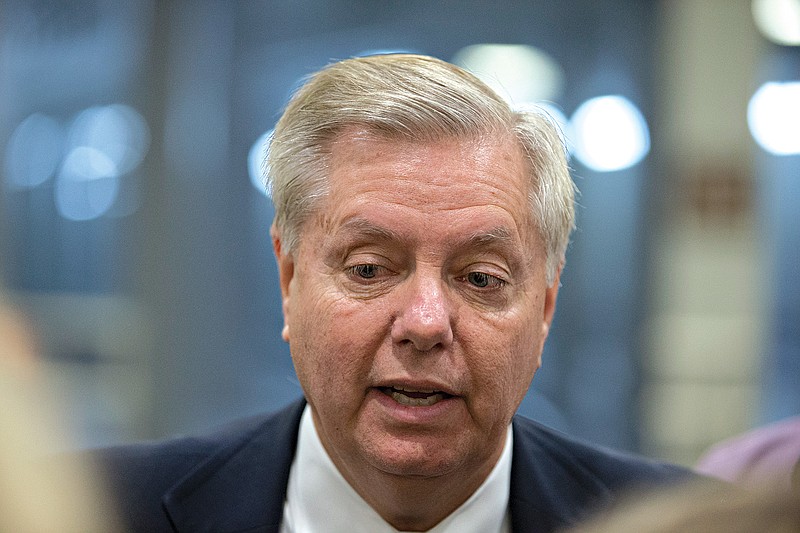WASHINGTON-Joining one of the most serious efforts to find common ground on guns in years, Sen. Lindsey Graham, a South Carolina Republican, stood with a bipartisan group of peers Tuesday to unveil a new proposal to prevent people on the no-fly list from buying firearms.
"I hope we can pass this," Graham said at the Capitol Hill news conference. "Let's put it this way: If we can't pass this, it truly is a broken system."
Despite increasing pressure on lawmakers to pass some kind of gun legislation in the wake of the mass shooting last week at the Pulse nightclub in Orlando, Fla., the Senate had voted down four amendments Monday in the midst of partisan gridlock. The new bill, spearheaded by Sen. Susan Collins, R-Maine, raises hopes of a bipartisan compromise since it would involve a significantly smaller group of potential gun buyers than those covered in the failed amendments.
The consolidated terror watch list has more than 1 million names. The bill proposed Tuesday would restrict only the 109,000 people on no-fly and selectee lists, people considered enough of a terror risk to go through additional security screenings before they board airplanes. Of those, roughly 2,800 are U.S. citizens, Collins said.
Under the "look-back" provision, drafted by Graham, individuals who have appeared on either list within the past five years also would be subject to review by the FBI if they try to buy guns.
Republicans opposed the broader Democratic proposals Monday because, they said, too many innocent Americans who mistakenly ended up on the terror watch lists would be stripped of their rights. With the smaller number of Americans on this list, Graham said, that is a risk it makes sense to take.
"The likelihood of someone being on this list and buying a gun and using it for a terrorist attack, to me, is far greater than the likelihood of an innocent person being on this list," Graham said at the news conference. "But here's the tiebreaker: We can fix the problem of the innocent person. Once the gun's sold, you can't fix that."
The proposed bill would allow individuals who were denied firearms to appeal the decisions in court.
Besides Graham and Collins, so far the bill has the support of Republican Sens. Kelly Ayotte of New Hampshire and Jeff Flake of Arizona and Democratic Sens. Tim Kaine of Virginia, Heidi Heitkamp of North Dakota, Martin Heinrich of New Mexico and Bill Nelson of Florida.
Democratic leaders on Tuesday would not rule out trying to reach an agreement.
"We now have serious bipartisan talks going on. We've never-we haven't had that in recent years, so that's good," said Senate Democratic leader Harry Reid of Nevada.
Sen. Charles Schumer, D-N.Y., a leading voice on gun control, called the Collins plan "a step in the right direction."
The key question, though, is "not whether Susan Collins will step forward and try to offer a compromise, but whether 20 Republicans will finally join her so we can get something done," Schumer said.
Republican leaders seemed reluctant. Senate Majority Whip John Cornyn, R-Texas, said he supported Collins getting a vote on her plan.
However he called it "a slippery slope when an American citizen is denied a constitutional right without forcing the government to come forward with some evidence on the front end."
The White House also weighed in Tuesday, saying that though they are willing to consider the bipartisan proposal, it does not make up for the Senate's failure to pass Monday's amendments.
"Frankly, I do not know why you would water down a proposal that would prevent everyone who is suspected of having ties to terrorism from being able to purchase a gun," White House Press Secretary Josh Earnest said at a briefing. "But because Republicans have blocked that proposal, that's what some senators have had to resort to."
He said White House and Justice Department attorneys were looking over the proposal to decide whether the administration would support it.
Graham said he hoped this would be the bill that finally made it to the president's desk.
"To my friends at the NRA, I am with you most of the time," he said after the news conference. "I believe we are at war, and I can't think of a way to fight this war without somebody being inconvenienced. At the end of the day, once you sell the guy the gun, there is no getting it back."

